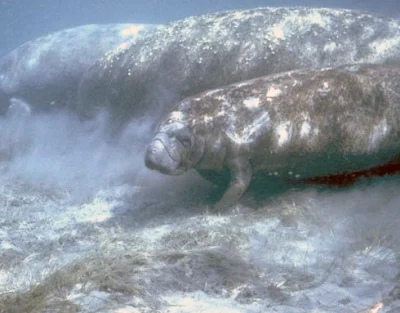30+ Interesting Facts About Manatees
- Manatees are large aquatic mammals. Dugongs and manatees are the only living members of the mammalian order Sirenia.
- There are three species of manatees: West Indian manatees, West African manatees, and the Amazonian manatees. West Indian and West African manatees inhabit seawater and freshwater habitats, while the Amazonian manatees live only in freshwater.
- Manatees can reach up to 13 feet, while their weight can exceed 1,600 kg. Amazonian manatees are the smallest among these mammals.
- A fossil discovery proves that manatees appeared on Earth 47 million years ago, while elephants are their closest living relatives. These aquatic mammals have lived on every continent except Antarctica. (Source)
- According to estimates, the skin of an adult manatee hosts numerous nematodes, algae, and other creatures. These also include previously unknown nematode species. (Source)
- Manatees are herbivorous animals that eat aquatic plants, algae, and seagrass. However, they sometimes eat small animals such as fish and clams.
- Manatees’ food is low on nutrition, which forces them to eat up to 10% of their body weight daily. Their intestines are 100 feet long, which assists in handling this diet.
- All
manatee species are named according to their locations. Amazonian manatees
inhabit the Amazon River, while West Indian and West African manatees live on the
east coast of the Americas and the west coast of Africa.

Three manatee species live in different locations - According to estimates, there are more than 13,000 manatees in the world. Nearly half of them are in the southeastern USA and Puerto Rico. (Source)
- Manatees usually have no natural threats due to the absence of large predating animals in their habitats. Their main threats are collision with boats and habitat loss. IUCN has listed all three manatee species as vulnerable to extinction.
- Scientists initially considered manatees unintelligent due to their tiny and simple brains. However, later studies have proved they are more intelligent than their brains suggest. (Source)
- Manatees have small spherical eyes with dichromatic vision. They can distinguish blue and green colors but cannot view red and blue-green colors. (Source)
- Manatees have 24 to 32 molars at the back of their mouth. At the front of their upper and lower jaws, they have rigid pads that assist in crushing plants in their food.
- Manatees are among a few mammals that can replace their teeth throughout their lives. They develop new teeth at the back of their jaw. (Source)
- Almost all mammals have seven cervical vertebrae, except manatees and sloths. Manatees have six vertebrae in their necks, which restrict the turning motion of their heads.
- The average swimming speed of manatees is 5 mph. But in extreme cases, they can achieve 15 mph in short bursts.
- Female manatees usually give birth to a single calf after two to three years. They feed their babies for up to two years.
- There are several differences between manatees and dugongs. Dugongs live exclusively in seawater, while manatees can inhabit freshwater habitats. Their physical differences include the shape of their tails, snouts, and eyesight.
- Manatees cannot remain in water with temperatures below 68 F (20 C). A temperature below this level for a long duration can cause sickness and death in this tropical animal.
- The accumulation of microscopic algae causes red tide in marine water. They are toxic to manatees and can become deadly by affecting their motor function.
- The average lifespan for manatees in the wild is 40 years. However, they can live longer in captivity due to protection from boats.
- The oldest manatee in captivity died at 69 years in 2017. This mammal lived for 67 years at a museum. (Source)
- According to estimates, sailors mistook manatees for mermaids (mythical creatures) centuries ago. It is due to manatees’ features such as flat tails, fingerlike bones in the forelimbs, etc. (Source)
- Manatees are solitary animals and spend nearly half of the day sleeping underwater. They usually eat in shallow water for the majority of the remaining time.

Manatees spend most of the day sleeping underwater - Manatees never leave the water but must surface to breathe air after every few minutes. They can remain underwater for 15 minutes while resting.
- Manatees are the first known mammals that use sensory hairs on their face and body to detect movement in the water. It compensates for their poor vision in murky water. Unlike most other mammals with very few facial hairs, they have hairs on nine distinct regions of the face. (Source)
- Manatees were on the brink of extinction during the 1970s due to habitat destruction and speedboats. However, power companies worked with environmentalists to provide them refuge in the warm waters of power plants. (Source)
- Manatees can replace 90% of the air in their lungs with each breath. This rate is only 10% in humans.
- Manatees use their unique flat rounded tail and forelimbs for swimming. Like cetaceans, they lack hind limbs.
- Unlike other aquatic mammals, manatees do not have thick blubber. They look fat due to their large digestive tract (stomach and intestines).
- Calves are born underwater, and the mother brings newborns to the surface for breathing. They can start swimming after an hour.



Comments
Post a Comment